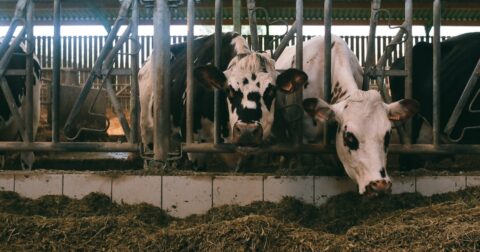Perspective
Critics Declared Veganism Dead in 2025. Here’s What Those Obituaries Are Missing.
Food•5 min read
Explainer
The meat industry is controlled by a few deeply connected corporations that wreak havoc on the planet and exploit workers and marginalized communities without consequence.


Words by Sentient Media
The upper echelons of the meat industry are composed of a select few deeply connected corporations—JBS, Tyson, Smithfield, Perdue, we’re looking at you—that receive massive government subsidies, wreak havoc on the planet, and exploit workers and marginalized communities without consequence. And while the connection between meat, money, and politics is complicated, it’s worth exploring. Big Ag’s struggle to feed the world impacts our lives and the lives of billions of farmed animals every day.
Meat requires a lot of effort to produce. But it is always available and relatively cheap to buy. This is because industrial meat production is heavily subsidized by governments.
Many big meat corporations in the U.S. and UK receive a lot of their income from government funding. Governments also subsidize corn and soy production for farmed animal feed and enable clearing vast swaths of natural habitat for grazing land.
Pollution from industrial animal farming drives environmental and public health crises. It also generates at least 37 percent of all greenhouse gas emissions, worsening the climate crisis.
Subsidies for industrial fishing drive marine ecosystem destruction. Fifty-four percent of industrial fishing would be unprofitable without these subsidies. Industrial fishing also threatens food security for communities that primarily rely on seafood.
Meat corporations use government subsidies to lobby for policies that protect their interests and profits. Ag-gag laws prevent reporting on industrial farming conditions. But information leaked over years has made the picture clear.
Farmed animals are routinely brutalized and kept under inhumane conditions. The workers farming them are severely marginalized and underpaid for their hazardous long hours of work. Meat producers also threaten local food security via corporate consolidation just six of the world’s largest meat producers dominate the sector and buy up smaller meat processors that may operate more sustainably and ethically. Political efforts to alter this system have been met with fierce opposition.
The narrative around meat needs to change. Industrial animal farming’s environmental, public health, and food security impacts need to become politically unappealing. We can engage in a variety of actions to change the politics of meat. We can petition our representatives to tax, not subsidize, industrial meat producers.
How we eat needs to shift as well. Plant-based diets and lab-grown meat offer compelling and sustainable alternatives. We must support local, ethical, and sustainable farming. This helps protect biodiversity, food security, and public health while mitigating the impacts of climate change.